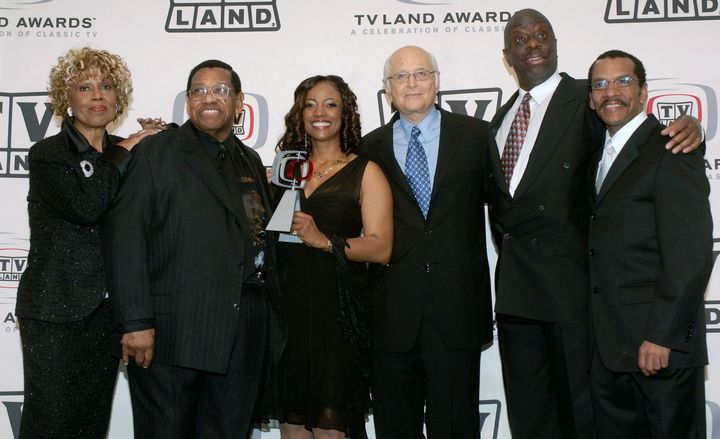
Norman Lear, the boundary-pushing television writer whose sitcoms changed the face of popular culture in the 20th century, died Tuesday. He was 101.
An Air Force veteran who served in World War II before creating “All in the Family,” “Sanford and Son,” “Maude,” “Good Times,” “The Jeffersons,” “Mary Hartman, Mary Hartman” and “One Day at a Time,” Lear played an essential role in transitioning TV comedies from idealistic escapism to honest portraits of American life.
Sitcoms were forever changed when Lear’s shows found success in the 1970s. Gone, more or less, were the pat premises of “The Andy Griffith Show,” “Father Knows Best,” “I Love Lucy” and “Leave It to Beaver.” The blue-collar families in Lear’s programs sparred about the country’s political and social divides; they fretted about money, happiness, class, race, homosexuality, abortion, women’s rights, health concerns and bigotry. At the time, Lear’s work forged a sly opposition to Richard Nixon, the Republican president who railed against progressivism. Today, such topics are embedded in the DNA of many sitcoms.

CBS Photo Archive via Getty Images
“I had realized that the shows that were on television for years like ‘The Beverly Hillbillies’ and ‘Petticoat Junction,’ which are perfectly good shows, had episodes where the biggest problem a family might face would have been that the roast was ruined when the boss was coming over to dinner,” Lear said in 2016. “That was fine, but it made a giant statement, too: There were no women or their problems in American life on television. There were no health issues. There were no abortions. There were no economic problems. The worst thing that could happen was the roast would be ruined. I realized that was a giant statement — that we weren’t making any statements.”
Lear, who’s said he never understood why much of America belittled minorities, grew up Jewish and middle-class in Connecticut. He had a complicated relationship with his father, who was arrested for selling fake bonds when Lear was 9. Lear dropped out of college to enlist in the war, after which he moved to Los Angeles and landed gigs writing for the comedy duo Dean Martin and Jerry Lewis, as well as the “The Colgate Comedy Hour” and “The George Gobel Show.” In 1968, he received an Oscar nomination for co-writing the movie “Divorce American Style,” starring Dick Van Dyke and Debbie Reynolds.
Lear drew inspiration from his parents when creating the “All in the Family” characters, making Archie Bunker a working-class curmudgeon and Edith Bunker a ditzy but loving housewife. “That’s how I grew up,” Lear said in 2005. “Those are my people, all of them. My family argued at the top of their lungs and on the edge of their nerves, forever.”
On a list published in 2002, TV Guide ranked “All in the Family” the fourth-greatest TV show of all time. Throughout its nine-season run, it won three Emmy Awards for Outstanding Comedy Series and hatched several spinoffs, including “Maude,” “The Jeffersons” and “Archie Bunker’s Place.” Each of these shows also addressed topics not often broadcast in prime-time entertainment.

Lear’s output slowed in the 1980s and beyond, though he did create the short-lived series “Sunday Dinner” and “704 Hauser,” which depicted a new clan living in the “All in the Family” house.
Along the way, he became a political activist, founding a progressive advocacy group in opposition to televangelist Jerry Falwell’s Moral Majority. Lear also launched a campaign to encourage voter registration among young Americans and spoke out in favor of the 2015 nuclear agreement between Iran and the United Nations Security Council.
“It takes a passion and a devotion to the subject,” Lear said in 2008, referring to his activism. “And it’s a desire to pass that passion on — thinking of it as a lot of dry grass that’s just waiting for the spark. I think that’s as good a definition, as I’ve thought of anyway, as what showmanship is all about.”
Lear married three times and has six children. The moving 2016 documentary “Norman Lear: Just Another Version of You,” based on his 2014 autobiography, presents Lear as a family man devoted to fair-minded liberal politics. In 2017, Lear was awarded a prestigious Kennedy Center Honor for his contributions to culture. He declined to attend the ceremony, citing his opposition to President Donald Trump, who “refuses to fund the arts and humanities.”
In 2017, Lear rebooted his series “One Day at a Time” with a Latino cast; it ran through 2020. The show basked in positive reception, proving that Lear’s work still resonates today. In syndication, his sitcoms remain fixtures.
In September 2019, at age 97, Lear became the oldest Emmy winner when he was awarded Outstanding Variety Special (Live) for “Live in Front of a Studio Audience: Norman Lear’s ‘All In The Family’ And ‘The Jeffersons.’” He broke his own record a year later, winning the same award for “Live In Front Of A Studio Audience: ‘All In The Family’ And ‘Good Times.’”
The degree to which Lear helped advance conversations surrounding America’s stratification while still maintaining an optimistic vantage cannot be overestimated. Of course, he didn’t see it that way. “The notion of the little half-hour comedy changing things is something I think is silly,” Lear said in 2005. But popular culture does shape the national conversation, and Lear’s curiosity about what makes us tick ― “shared humanity,” as he once called it ― had an immeasurable effect on social consciousness. He spawned at least two generations of TV writers who continue to expand on his blueprints, all because he used the medium to question societal norms.
“I never lost my childlike view of the world,” Lear said in his documentary.
Sara Bondioli contributed reporting.
